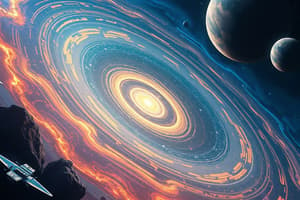Podcast
Questions and Answers
What is the Nebular hypothesis and who proposed it?
What is the Nebular hypothesis and who proposed it?
The Nebular hypothesis is the theory that suggests that the planets were formed from a rotating cloud of material around a young sun. It was proposed by German philosopher Immanuel Kant and revised by mathematician Laplace.
What did Chamberlain and Moulton theorize about the formation of planets?
What did Chamberlain and Moulton theorize about the formation of planets?
Chamberlain and Moulton theorized that a wandering star approached the sun, causing a separation of material from the solar surface which eventually condensed into planets.
What is the significance of the Nebular hypothesis in the study of the origin of the Earth?
What is the significance of the Nebular hypothesis in the study of the origin of the Earth?
The Nebular hypothesis provides a plausible explanation for the formation of the Earth and other planets in our solar system from a rotating cloud of material around the young sun.
How did the material separated from the solar surface continue to revolve around the sun?
How did the material separated from the solar surface continue to revolve around the sun?
What is the definition of geography?
What is the definition of geography?
What does geography seek to understand?
What does geography seek to understand?
What is the relationship between geography and planetary science?
What is the relationship between geography and planetary science?
Who is credited with using the word 'γεωγραφία' in a book title?
Who is credited with using the word 'γεωγραφία' in a book title?
When did the earliest attempts to understand the world spatially occur?
When did the earliest attempts to understand the world spatially occur?
Flashcards are hidden until you start studying
Study Notes
Nebular Hypothesis
- Proposed by Emmanuel Swedenborg and later developed by Pierre-Simon Laplace.
- Suggests that the solar system formed from a cloud of gas and dust, or nebula, that collapsed under gravity.
Chamberlain and Moulton's Planet Formation Theory
- Introduced a theory incorporating gravitational interactions between the Sun and a passing star.
- Proposed that planets formed from the ejected material of the Sun due to tidal forces exerted by the other star.
Significance of the Nebular Hypothesis
- Provides a foundational framework for understanding the origin of the solar system.
- Connects observations of celestial bodies’ movements and compositions to theoretical models of formation.
Material Revolution around the Sun
- After separation from the solar surface, the material continued to revolve due to gravitational attraction.
- This motion contributed to the aggregation of matter, eventually leading to the formation of planets.
Definition of Geography
- The study of places and the relationships between people and their environments.
- Examines the physical features of the Earth and the human societies spread across it.
Objectives of Geography
- Seeks to understand spatial relationships, patterns, and processes on Earth.
- Investigates how human activities impact the Earth’s surface and how the environment influences human behavior.
Relationship between Geography and Planetary Science
- Both disciplines explore spatial relationships and physical features of celestial bodies, including Earth.
- Geography serves as a subfield within planetary science, focusing on Earth’s unique systems and processes.
Origin of the Term 'Geography'
- The term 'γεωγραφία' (geographia) was first used in a book title by Eratosthenes, a Greek scholar and mathematician.
Early Spatial Understanding
- The earliest attempts to understand the world spatially occurred around the 6th century BCE.
- Ancient civilizations began creating maps and observing geographical patterns, laying the groundwork for modern geography.
Studying That Suits You
Use AI to generate personalized quizzes and flashcards to suit your learning preferences.




